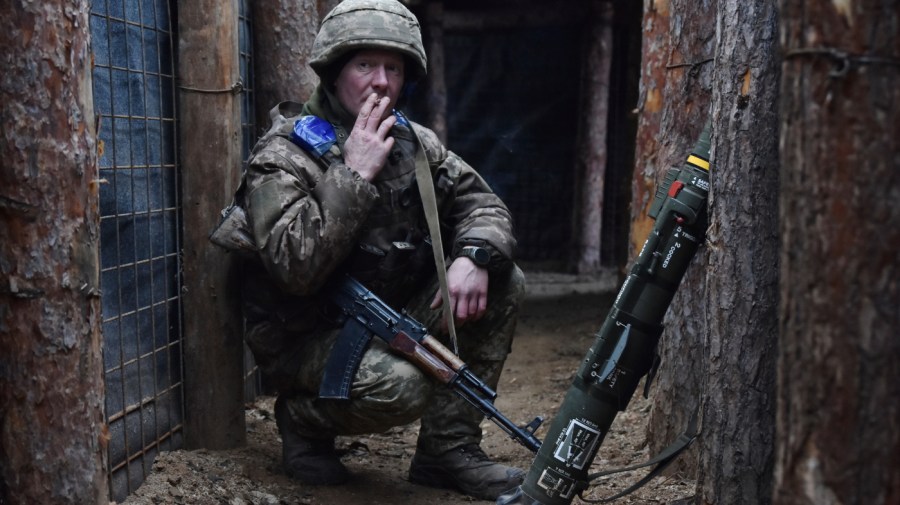
Donald Trump’s election victory in November brought him praise and congratulations from leaders and governments around the world.
One of the more surprising messages appeared in a post on X from the Taliban in Afghanistan. The country’s foreign ministry expressed hope that the president-elect’s impending return to the White House would allow “both nations to open a new chapter of relations based on mutual engagement.”
The group’s overture reaffirmed the resounding futility of the longest war in America’s history. For 20 years — from a month after the 9/11 attacks until summer 2021 — the U.S. military fought and failed to vanquish the Taliban. More than 2,400 troops lost their lives in Afghanistan, along with almost 4,500 killed in Iraq.
The men and women who survived the “forever wars” carried home the fraught question of whether their fallen comrades died in vain. Trump has tapped three of them for high-level positions in his incoming administration.
Vice President-elect JD Vance and Tulsi Gabbard, Trump’s nominee for director of national intelligence, deployed to Iraq. His pick for defense secretary, Pete Hegseth, served tours of duty in Iraq and Afghanistan.
The trio’s stated aversion to U.S. intervention abroad, including in Ukraine, trace back to their misgivings about the forever wars.
Two years before winning election to the Senate in 2022, Vance wrote, “I left for Iraq in 2005, a young idealist committed to spreading democracy and liberalism to the backward nations of the world. I returned in 2006, skeptical of the war and the ideology that underpinned it.”
Vance, Gabbard and Hegseth frame Trump’s “America first” isolationism as a principled corrective to the country’s post-9/11 military misadventures. But their opposition to U.S. support for Ukraine lays bare a worldview without a moral compass.
All three appear oblivious to a dark irony: After years of claiming that America’s political and military establishment betrayed their generation of veterans, they soon will assume the role of betrayer, abandoning Ukrainian troops to their fate.
I reported from Afghanistan for three years starting in 2011 and I’ve covered the war in Ukraine since shortly before Russian troops and tanks crossed the border in early 2022. In terms of U.S. involvement, an obvious distinction separates the forever wars from Russia’s full-scale invasion, one that Trump and his team prefer to omit when they talk of shrinking America’s military presence overseas.
U.S. leaders sent hundreds of thousands of troops to topple the regimes in Afghanistan and Iraq and to occupy both countries. They have shipped only weapons, equipment and ammunition to aid Kyiv in its just war of self-defense. There is little comparison between America’s role then and now — even if Vance, presenting himself as “anti-war,” conveyed that false equivalence on the Senate floor last spring after Congress passed a $61 billion funding package for Ukraine.
So I’ll offer a reminder that no U.S. troops are fighting (or dying) in Ukraine’s struggle against Russian President Vladimir Putin, who figures to emerge as the greatest beneficiary of America’s retreat from the world.
If Trump withholds assistance from Ukraine to force President Volodymyr Zelensky toward a cease-fire dictated by Moscow, the move will prove “anti-war” only in the sense that over time Ukrainian troops will lose the capability to defend their homeland. Countless more will die at Putin’s hands.
In military parlance, “Got your six” means “I’ve got your back.” The culture of the U.S. armed forces teaches troops to always protect one another, an ethos they uphold with soldiers of other nations — as in Afghanistan and Iraq — who patrol alongside them as partners.
Since Trump avoided military service during the Vietnam War, Vance, Gabbard and Hegseth could draw on their experience in uniform to enlighten him about the concept of mutual vigilance. They could seek to persuade him that America bears a moral obligation to protect a democratic ally invaded by a fascist dictator and that fulfilling its obligation enhances the safety of Ukraine, America and the entire West.
They instead will turn their backs on Kyiv, abetting a national act of desertion that will compound rather than redress the tragedy of the forever wars.
I’ve interviewed dozens of veterans over the past decade who doubted the purpose of their service in those ill-conceived, ill-fated conflicts. In 2019, while reporting a story on moral injury, I spoke with former Army Sgt. Nate Vass, who deployed to Afghanistan in 2006. He finished his 16-month combat tour beset by post-traumatic stress disorder and deep disillusionment about a war he called misguided.
“I feel a sense of bitterness about all of it,” he told me. He mentioned friends killed overseas and others who died by suicide after coming home. “For what?”
The specter of betrayal that shadows so many of the country’s 21st-century veterans arises, in large part, from the absence of clarity about why four successive presidents — including Trump — sent them to Afghanistan and Iraq. No such strategic or moral haze obscures the reasons for supporting Ukraine.
The country’s brave fight to preserve its freedom, territory, culture and national identity exemplifies the democratic ideals that define the West — ideals that Vance, Gabbard and Hegseth revere in word but scorn in deed. Their forsaking of Ukraine will leave more blood on America’s conscience, if not their own.
Martin Kuz is an independent journalist covering Ukraine. He writes at Reporting on Ukraine.












